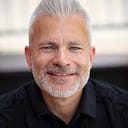The Best Founders Are The Unintentional Ones

Now that we have a startup industry and successful founders are business icons and cultural celebrities, being a founder is of interest to more people. The problem is the best and most successful founders never intended to do so.
I’ve had the opportunity to meet and speak with thousands of founders through our work building digital products and solving data problems at AWH, my involvement with Startup Grind, angel investing, and speaking about creating products and companies. The one constant is that the best founders, and the ones who have the best chance of their companies succeeding, never intended to become a founder and to start a company.
Being a successful founder isn’t the same as pursuing other professions. Seemingly every major university now has a school of entrepreneurship. As much as we are trying to figure out how to educate and train people to be successful founders, wanting to be and learning how to be a founder isn’t the same as wanting to be and learning how to be an accountant, lawyer, architect, or any other profession. Wanting to be a founder isn’t really a thing as it turns out. Wanting to start a company is just that, a want. It isn’t based in anything related to the principles actually needed to have a chance at being successful at it, like identifying and understanding a problem you are capable of solving and that is worth solving. Wanting to be a founder is hollow, whereas being a founder is deep in purpose around a particular problem that isn’t about the founder very much at all.
People who pursue being a founder for the sake of being a founder because they think it will make them cool and different from those who are pursuing other professions are just being contrarian. These founders have very little chance of actually being a successful founder because their founder pursuit is about them being different instead of it being about solving a high-value problem that can have some commercial success by improving people’s lives or how companies operate.
Being a founder is probably the single most significant on the job training experience there is. There will be an eternal debate about whether entrepreneurship can be taught. Personally, I believe elements of entrepreneurship can be taught such as learning how to run experiments, how to prioritize, and how to conduct user interviews, but being a founder can’t be taught as a profession. Being a founder is not an academic exercise. It is an experiential one.
The founders who end up starting and leading companies not because they intended too, but because they are compelled too are the ones who have the best chance of succeeding. These founders begrudgingly wear the label of founder initially and often throughout their tenure as the problem and customer take center stage for them. They recognize they know far less about building and running a company. The unintentional founders are, and stay, much more humble even when they experience some success.
Unintentional founders are a better bet from every perspective. They are more likely to be open to advice and learning which makes them so much more coachable and advisable. They foster a culture that people want to be a part of and contribute to that culture, so it is easier for them to recruit. They understand the problem better than anyone and are very intentional about learning even more about the impact on customers so they can build better and more valuable products. And unintentional founders don’t raise investment for the PR sake of looking good. They raise money to fund the team, product, and engine that works to solve the problem in a manner that customers want and value.
Being an unintentional founder is the essence of entrepreneurship. Problem and purpose over ego and personal recognition.
If you think you might want to be a founder someday, or you are actively starting a company, ask yourself why? Is it because you want to be known as a founder or is it because you are driven to solve a problem and the challenge of doing so? If you don’t have a problem or challenge you are driven to solve, wait until you do, and don’t become a Founder just for the sake of being a Founder.
